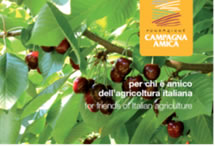About Campagna Amica Foundation
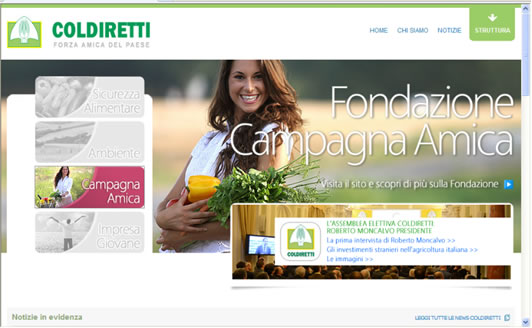
Promoted by Coldiretti, Campagna Amica Fondation was created in 2008 to carry out initiatives to increase the perceived value of Italian agriculture, which has a key role in environmental protection, land, traditions and culture preservation, health, food security guarantees, access to food at the right price.
Campagna Amica promotes and supports Italian agriculture in three key areas: direct sales, tourism and holidays in the countryside and environmental sustainability, representing a point of reference for everybody who is interested in sustainability , territory and food quality.
Campagna Amica is based on the principle that the right sustainable, ethical, beautiful and healthy world is not possible unless there is the right distribution between the income of those who work and the satisfaction of those who consume. For this reason, in the direct relationship between agriculture and citizens, it has seen a possible way to give the correct share of the added value of the product to farmers, together with guaranteeing quality and certainties to consumers.
The Campagna Amica Network
The Fondazione Campagna Amica is open to consumers, farmers and citizens to respond to today’s pertinent issues: food, tourism and ecology.Campagna Amica is the main large Italian network of points of direct sales from the producer to the consumer. Farmer’s market, farms shops, agricultural cooperatives, agricultural associations, companies in the km 0 circuit (Food Miles), Agritourisms, member of Community Supported Agriculture (CSA): Campagna Amica collects and promotes the Points where agricultural products supply is done directly from producer to consumer.
In Campagna Amica Points of Sale you are sure to find seasonal products, freshness, quality, taste and the guarantee of 100% Italian origin. Consumers can experience an informed shopping. Campagna Amica believes that the quality of what you eat is deeply linked with its origin.
Short Food chain, price trends, purchasing patterns, source of agricultural products, seasonality, km 0, no GMO: you come across a world of good products, safe and controlled, directly from the countryside to your table.
Campagna Amica also aims to improve the culture of countryside: it supports farm holidays, product sales, hospitality, traditional cousine, food and wine routes, educational farms, traditional celebrations…
How does it work?
Campagna Amica is a distribution channel different from wholesalers and traditional retailers. It is a network of farmers who want to sell their products direct to the consumer through farm shops, farmers markets, home delivery, on-farm catering or pick-your-own farms. It offers the opportunity to improve and develop retailing skills and help your businesses thrive. It also promotes the highest standards for farmers markets and farm shops.
It is a Network of producers who have:
- the same distinctive brand
- the same regulations governing use of the brand
- the same rules of conduct
- the same code of environmental ethics
- the same system of control from a third party
The NETWORK
FARMERS MARKETS: markets in which farmers are members of Campagna Amica and they can sell exclusively their agricultural, Italian and zero km products. In the Campagna Amica Market you can do your shopping in a sustainable and responsible way, buying seasonal agricultural products, selected with care, always fresh and of Italian origin controlled and guaranteed.Campagna Amica FARMS are farms where the farmer sells its products directly. Also in this case products are strictly agricultural and Italian, their origin being monitored and guaranteed by Campagna Amica.
Campagna Amica AGRITOURISM are the agritourism farms, which sell their products directly and / or offering them in their restaurant, the Campagna Amica menu, made up mainly of the farm's products and those of Campagna Amica Network (strictly agricultural and of Italian origin).
LA BOTTEGA ITALIANA is a shop in town where you can buy the products of Italian Agricultural Production, traced and controlled by a third body certification. Here you always find the values of Campagna Amica: Italian spirit, freshness, sustainability and agricultural leadership.
RESTAURANTS “CAMPAGNA AMICA IN YOUR PLATES" are restaurants where meals, foods and beverage come from Italian farms
URBAN GARDENS: gardens in the city complying with the principles of Campagna Amica, in order to enhance social gathering, respect for seasonality and biodiversity protection.
SOLIDARITY BASED PURCHASING GROUPS consumers who cooperate in order to buy food directly from the Campagna Amica producers.
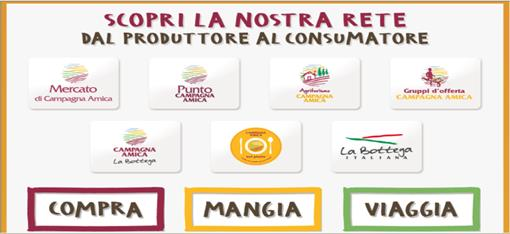
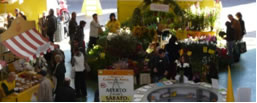
Have a walk with us in the Farmers Market in Rome
One of the biggest farmers’ market in Italy is the Circo Massimo Market. The Circo Massimo market operates every Saturday and Sunday hosting a mix of undercover and open stalls. Stalls number around 25 in winter and up to 55 during summer. Up to 2000 people regularly attend it, rising to around 5000 during gourmet food and wine festivals and holidays.
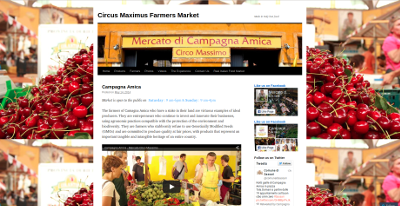
Campagna Amica in figures
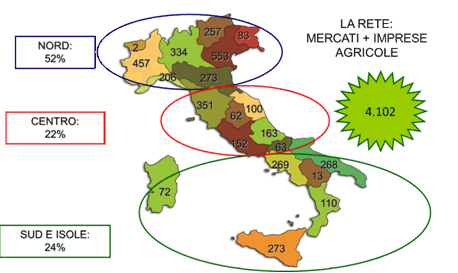
This logo gives confidence to consumers who want a wide range of quality, locally reared or produced and ethically retailed foods.
85% of Farmers’ Market organized in Italy come under the Campagna Amica umbrella brand.
Farmers Markets : 1252
Producers involved: 16.000
Selling Farms: 2696
Agritourism: 539
Cooperatives: 162
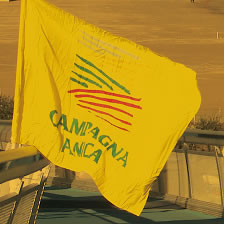
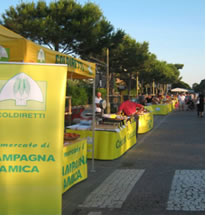
|
Safety Quality Traceability Authenticity Warranty Territoriality Convenience Seasonality |
Sustainability Animal welfare Compatibility Naturalness Equity Recyclability Biodiversity Kilometer zero |

Test your market before making a full commitment
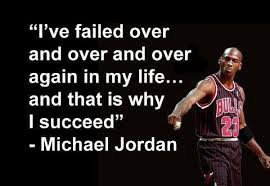
By introducing a new commercial function in your farm, and developing your skills as a salesman, you are actually starting nothing less than a DIVERSIFICATION STRATEGY!
This is not always easy, but it is essential!
This represents the “try-out” period of your new activity to be engaged with minimum investment. Choose the best time of year to run this test, the period when your future clients and you will be available. Determine the duration of your test: this should be between one week and one month, depending on your activity (make and sell a small number of cheeses, provide seasonal work for several of your neighbors, realize the maintenance of drive-ways of a nearby community, etc.)
By completing this experiment, you test your work organization, your internal resources, and the compatibility of your new activity with your regular work on the farm.
An important reflection: you are a farmer, and you were, until now, supposed to be particularly good at interacting with other people. What can you do to improve your professionalism, so that the try-out period is a success?
Here are a few suggestions:
- if you are not so young, then make space for young generations! Your daughter, your son, your youngest employees can comply with this task better than you: young people are more used with getting in touch with people ...
- try to walk (figuratively) in your client’s shoes. For example, families are coming from the town to relax and do something nice. Prepare nice spaces to stay, and a few, simple activities for them (e.g. on Sundays between 8 and 10 a.m. children can feed the hens (hens will be eating a little too much on Sundays, but it’s ok ...; or it is possible to take a picture with the pig/cow/horse and receive it by e-mail, which is a good way to collect a mailing list, to keep people informed about new products ... ; or, else, you can summon a dog trainer and ask him to give a lesson on dogs, but also a space with sand to play with, well covered so that cats do not ... use it, could do ...)
- prepare posters, it is a thing you can do in your spare time: each poster explains a part of your farm: what it is, what is done there, etc. A few posters can also illustrate life on the farm: at what time do you wake up? What do you regularly do? Take pictures of yourself and insert them. If you make the posters with a computer, then you can also show them on your Facebook page (because you do have a Facebook page, don’t you? It’s a MUST! You could even make a video, like this one... http://www.youtube.com/watch?v=MBf4IekhV_I. The poster and video can help people understand that farmers’ work is important, and adds a lot of added value to products, a value that has to be appreciated and remunerated ...)
At the end of this phase you will be able to show
- Who do you sell to? - Your commercial targets
- What are you selling? - Range of products or services on offer
- How do you sell? - Negotiating, tariffs
- When do you sell? - Seasonally, trimesters, monthly, weekly, daily
- Where do you sell? - Methods of contact
Tips & Warnings: read a lot, analyze your competitor and use little focus groups to determine the level of your brand awareness in the marketplace. Unless you track your progress, you have no way of knowing whether customers are aware of your products
Take advantage of this period to meet your clients, to transact with them and to test the commercial reality of your product or service:
- Does it respond well to needs?
- Is it attractive?
- Do you know how to sell it?
- What kind of adjustments will be necessary?
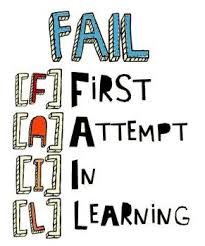
Case study: Watch the video and answer the question
CASCINA PIROLA case study
- What are the characteristics of this farm and its products?
- What are the levers that moved the idea of business development?
- What is the secret of its success?
- What ideas can we take from this experience



